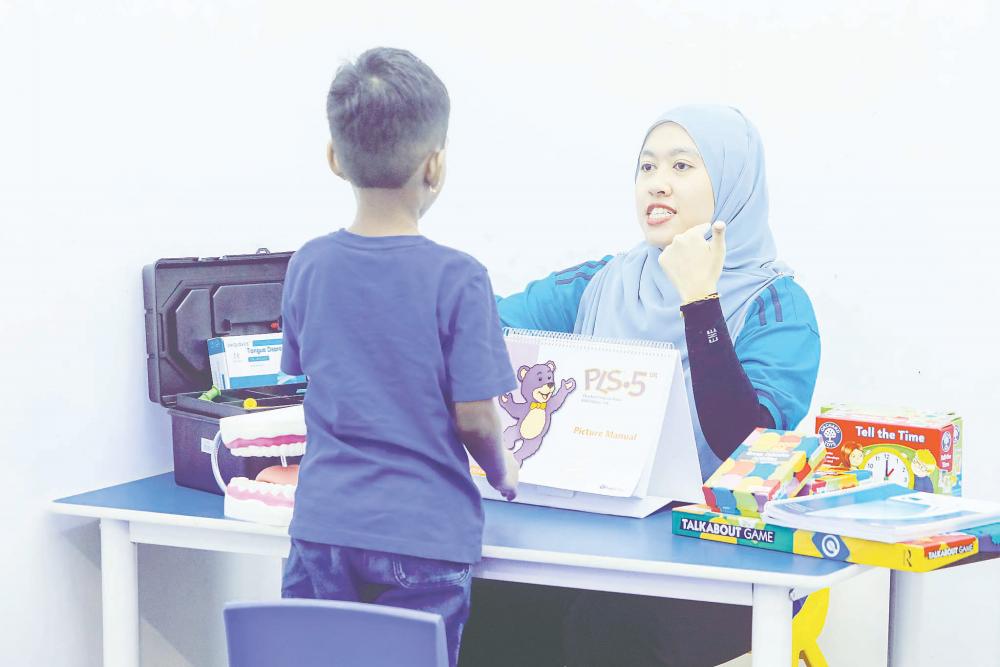PETALING JAYA: The Malaysian Association of Speech-Language and Hearing has urged the government to recruit more listening and spoken language specialists as there are only three in the country – two in Peninsular Malaysia and one in East Malaysia – with a population of 34.1 million.
Speaking in conjunction with Kids’ Ear, Nose and Throat (ENT) Health Month, which falls in February, its listening and spoken language specialist and speech-language therapist Hee Han Hui highlighted the urgent need for more professionals, particularly in rural areas where accessibility remains a challenge.
“These specialists play a critical role in helping deaf and hard-of-hearing (DHH) children develop their communication skills. They work closely with parents to guide children in audition, speech, language, cognition, social interaction and literacy development.”
Health Minister Datuk Seri Dr Dzulkefly Ahmad recently said the Universal Newborn Hearing Screening (UNHS) programme diagnosed 987 infants with hearing problems in 2023.
Hee said research shows children who receive appropriate intervention before their first birthday achieve the best results in language, cognition and social skills.
She explained that early diagnosis, coupled with access to hearing technology, auditory-verbal therapy or sign language instruction, is crucial in helping children reach their full potential.
“With UNHS now in place, most children with hearing problems are detected early, which is a positive development but just the first step. Access to timely diagnosis, treatment and long-term support is just as critical.”
Beyond medical intervention, Hee said many DHH children still face social stigma, with some being judged for using hearing devices, while parents are often criticised for their communication choices.
She also pointed out that accessing hearing aids, cochlear implants and therapy remains a financial and logistical challenge for many families.
Sunway Medical Centre consultant paediatric ENT specialist Dr Priatharisiny Velayutham agreed that there is an urgent need for more trained professionals, despite the presence of about 800 certified audiologists in the country.
“This means our 34.1 million population only has one audiologist for every 42,500 people. This number is grossly inadequate compared with the 1 to 500 ratio we require.”
Priatharisiny said hearing loss falls into two categories – congenital, in which about 50% of cases are inherited, and acquired, which may be caused by loud noises.
In Malaysia, between one and three children per 1,000 are affected by hearing loss, with ear infections being the most common cause among school-age children.
“The World Health Organisation reported that about 466 million people worldwide suffered hearing loss in 2020. This figure is expected to almost double by 2050.”
Priatharisiny warned that noise-induced hearing loss, once linked to industrial environments, is now increasingly caused by personal devices such as smartphones and headphones.
She stressed that delayed intervention can lead to irreversible hearing damage, with many individuals suffering 50% hearing loss by the time they seek help or consult a specialist.
“Key barriers to early detection include a lack of awareness, parental denial, delays in diagnosis – particularly in rural areas where access to hearing checks may be limited – and financial constraints.
“Parents may not realise that exposing adolescents to more than 80 minutes of headphone use puts them at a 4.7 times higher risk of hearing loss compared with those who use them less frequently.”
To better support children with hearing impairments, Priatharisiny called for more hearing screenings in schools to detect hearing loss at the earliest possible stage, especially in rural areas.
“Teachers would benefit from additional training in areas such as the use of hearing devices and stronger collaboration with parents to enhance communication and learning.”









